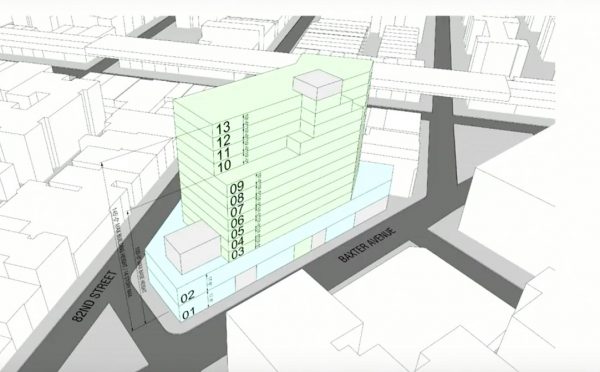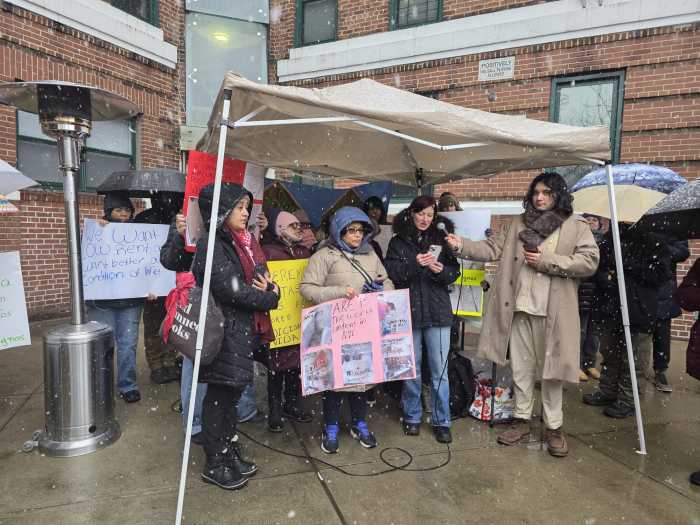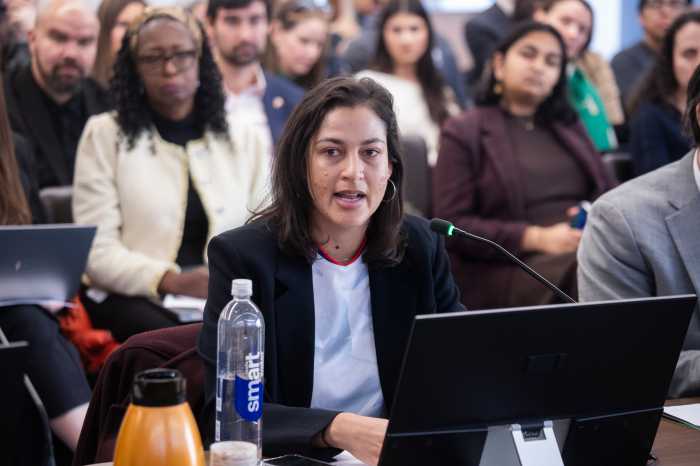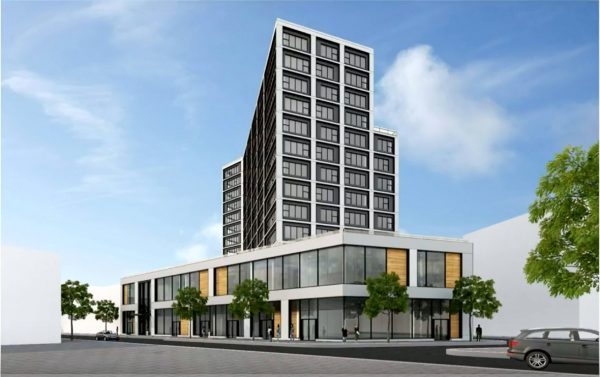
Rendering
May 4, 2018 By Tara Law
Councilmember Francisco Moya declared his support of a controversial development on 82nd St. in Elmhurst Thursday, saying that his office has negotiated a deal with the developer to lower the income levels for units designated ‘affordable’ and to add more low-income units.
The councilmember’s announcement represents a significant step forward for the developer, who needs the property to be rezoned in order to construct a 13-story building containing 120 apartments and a Target on the 40-31 82nd St. site.
With the councilmember’s support for the rezoning, the development is virtually assured to take place.
The deal that Moya struck with the developer would see 42 units deemed affordable, up from the proposed 36.
Under the deal, 20 percent of the housing units— or 24 apartments — are to be set aside for residents making 40 percent of the Area Median Income (AMI), or $31,080 for a family of three.
Additionally, 5 percent of the units—or six apartments— are to be set aside at 50 percent AMI; another six units at 60 percent AMI; and six unit at 80 percent AMI, or $68,720 for a three-person household.
Under the initial proposal, the 36 units would have all been set at 80 percent AMI.
The project has provoked controversy since it was first announced in Sept. 2016. Critics argue that the development would drive up housing prices; lead to congested streets; overburden public transportation; and contribute to school overcrowding. They also say that the Target planned for the building will drive out local businesses.
In March, Community Board 4 voted to reject the zoning change, which would permit the developer to build three floors beyond the existing zoning limit. Dozens of residents claimed that the development would lead to further gentrification during a public hearing prior to the community board’s vote.
Moya said that his support was contingent upon the developers honoring the affordable housing agreement, and praised the developers, Sun Equity Partners and Heskel Group, for their cooperation.
“I believe the contours of this plan can provide a framework for future discussions around affordable housing,” Moya said.
At the time of the community board meeting, the developer presented an affordable housing configuration that would designate 30 percent of the apartments as affordable—or 36—if the property were rezoned. The board was also told that the affordable units would be available to tenants who earned 80 percent AMI.
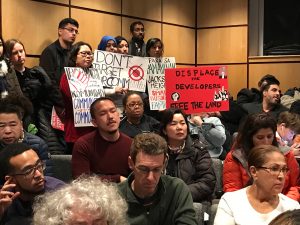
Community members at CB4 meeting
Opponents to the spot rezoning, including members of grassroots group Queens Neighborhoods United and U.S. Congress candidate Alexandria Ocasio-Cortez, expressed their opposition to the plan to Queens Borough President Melinda Katz at a land use meeting at Borough Hall yesterday.
Katz is currently reviewing the plan and will be announcing an advisory opinion on the rezoning in coming weeks. Moya notified Katz of his support for the plan, subject to the deal, in a letter yesterday afternoon.
Queens Neighborhoods United submitted a petition signed by 400 residents and a letter signed by local organizations, both of which called for Katz to reject the proposal.
The letter and petition discuss the possible gentrifying affect of the housing, and condemns Target as “business-killing.”
The rezoning would also set an “alarming precedent for future developers,” the letter said.
“If they allow so easily for a developer to come in and change the laws for this community, many other landlords will see this and want to do spot rezoning,” Tania Matoos, co-founder of Queens Neighborhoods United, explained after the meeting.
Congressional candidate Ocasio-Cortez also appeared during the hearing to urge Katz to reject the proposal. She bluntly argued that the city should not build any more “unaffordable” units, and that 100 percent of the new units should be “affordable.”
“When new housing is being built not for the community but for someone else, this becomes problematic for the core of our democracy and our economic dignity,” said Ocasio-Cortez.
Ocasio-Cortez also questioned whether the concerns of the community would be given equal weight to the voices of developers, who can afford to make big contributions to campaigns.
“Are we truly being heard, or is this a performance?” she said.
A few hours after the presentation, Mattos said that she would be “surprised” if the borough president decided to reject the proposal. Katz seemed more inclined to suggest ways to alter the project, rather than change the spot rezoning entirely, said Mattos.
“If she was against this development, she would have come out and said, ‘I’ve heard what you are saying and I’m going to say no to this rezoning,’” said Mattos.
Both Katz and the community board cannot veto the proposal, and can only advise the City Planning Commission, the City Council and the Mayor to turn down the application.
However, with Moya behind it, the City Council is almost certain to vote for the proposal, since it is customary for the council to follow the lead of the councilmember who represents the district where the proposed rezoning takes place. The mayor is also an advocate for affordable housing.
The petition Queens Neighborhoods United submitted to Katz is still live, and can be accessed at the link.
